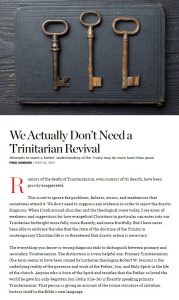Everything you think you know about the Trinity is wrong. It’s been wrong for a long, long time; centuries, actually. But what I am about to tell you will set you straight once and for all. I will show you mysteries you have not known. And by the time I’m done, you will finally understand why this obscure, abstract, and incomprehensible doctrine could actually make a practical difference in your life.
That’s the tone of far too many books on the doctrine of the Trinity. With surprising consistency spanning from the popular level to the scholarly, authors writing on this doctrine tend to adopt an attitude, and then generate arguments, indicating that the work to be done is a radical work of razing a condemned building, erecting something new (but really old!) in its place, and then outfitting this new Trinity structure with all kinds of previously unimagined, truly useful features.
 This pedagogical strategy, it seems to me, is catastrophic. In fact, it may be the main problem with Trinitarianism in the modern period. Whatever problems modern Christians may have when it comes to the doctrine of the Trinity (Have we ignored it? Been unenthusiastic about it? Taught it poorly, infrequently, and by rote? Failed to see its scriptural roots? Left it on a shelf by the door, only to be taken down when Jehovah’s Witnesses come knocking?), this drastic dose of unlearning is the wrong medicine. Whatever symptoms it may be intended to cure, it has long since overtaken those symptoms and has become the main sickness threatening the patient.
This pedagogical strategy, it seems to me, is catastrophic. In fact, it may be the main problem with Trinitarianism in the modern period. Whatever problems modern Christians may have when it comes to the doctrine of the Trinity (Have we ignored it? Been unenthusiastic about it? Taught it poorly, infrequently, and by rote? Failed to see its scriptural roots? Left it on a shelf by the door, only to be taken down when Jehovah’s Witnesses come knocking?), this drastic dose of unlearning is the wrong medicine. Whatever symptoms it may be intended to cure, it has long since overtaken those symptoms and has become the main sickness threatening the patient.
I wrote an article about this for Christianity Today. Check it out. And by the way, if you personally need a Trinitarian revival, go get you one. But do be careful about who you’re including in the “we” if you say “we need one.”